DFDS celebrates Ekol buy, and says shift to electric trucks going 'better than expected'
They have been partners since 2018, started acquisition talks in 2022 and now DFDS has ...

Shipping will “no longer be let off the hook for its massive impact on climate”, after members of the European Parliament, Council of Ministers and EC yesterday reached a deal that will see the sector subject to the EU Emissions Trading System (EU ETS) by January 2024.
The deal includes improvements to the EC’s original proposals, including methane and nitrous oxides as well as carbon emissions, and its scope broadened to include offshore vessels of 5,000 gt and over.
A joint EU, EP and Council of Ministers statement said the EU ETS would give: “A net benefit for the climate of 20m tonnes of CO2. It will also increase the revenues and 20m allowances will be earmarked for specific projects in the shipping sector via the Innovation Fund/Climate Investment Fund.”
Environmental groups have hailed the deal as “a defining moment” in the transition to sustainable shipping.
Jacob Armstrong, sustainable shipping officer at Transport & Environment (T&E), said: “No longer will shipping be let off the hook for its massive climate impact. This ambitious ETS covers all greenhouse gases, offshore vessels and ensuring funding for green shipping.”
T&E also pointed out that the inclusion of methane in the ETS will mean ships operating on LNG would also pay for emissions, giving a clear signal that this is not a clean fuel solution for shipping.
Mr Armstrong added: “The EU has thrown the gauntlet down to other jurisdictions, like the US, China, and Japan, to make this hugely important first step towards zero-emission shipping.”
T&E said following the deal on shipping, the EU would now turn its attention to extending the aviation ETS to flights to and from Europe, rather than just intra-EU, a concession to airlines until 2024. A separate ETS will govern emissions from land transport.
Parliament’s ETS rapporteur, Peter Liese, however, cautioned: “There are still very difficult points to be solved in the ETS negotiations, including free allowances for the industry, the innovation fund, the modernisation fund and the inclusion of heating and road transport. I hope it will be possible to find an agreement on these issues in the trilogue meeting on 16-17 December.”
Comment on this article